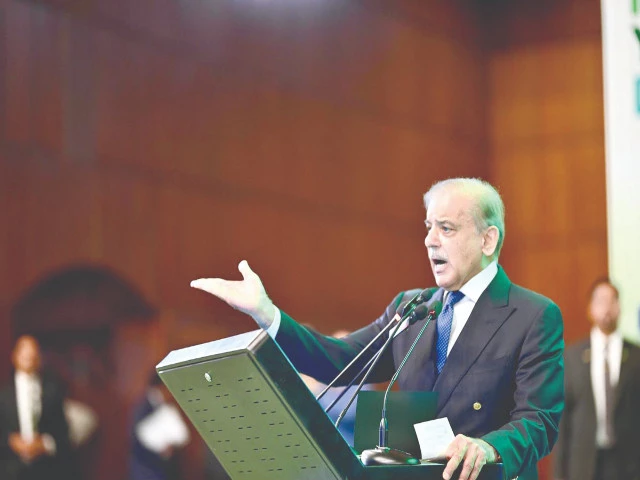ISLAMABAD:
Prime Minister Shehbaz Sharif on Tuesday warned India against choking Pakistan’s share of Indus River waters, vowing that not “a single drop” would be allowed to be stolen.
Declaring water the nation’s lifeblood, he vowed a decisive response to any attempt to cut the flow amid escalating tensions over New Delhi’s move to put the Indus Waters Treaty “in abeyance”, a step Islamabad has condemned as an act of war.
“I want to tell the enemy today that if you threaten to hold our water, then keep this in mind that you cannot snatch even one drop from Pakistan,” he said while speaking at a ceremony in the capital on the occasion of International Youth Day.
“You threaten to stop our water. If you attempt such a move, Pakistan will teach you a lesson you will never forget,” he added.
Terming water the lifeblood of the nation, the premier asserted there would be “no compromise” on Pakistan’s rights under international accords. He added that a “new Pakistan” had emerged after the armed forces dealt India a setback on May 10, when the Pakistan Air Force downed six Indian fighter jets, a historic moment for the nation.
The premier’s remarks came amid India’s warning to dry out Pakistan, waging a ‘hydel war’ against the country. In April, New Delhi announced that it was placing the Indus Waters Treaty (IWT) “in abeyance” following an attack in Pahalgam, in occupied Kashmir, that claimed 26 lives — an incident the Modi-led government, without providing evidence, attributed to Islamabad.
Pakistan condemned any move to halt its allocated water flow as an “act of war”, stressing that the IWT contains no clause allowing unilateral suspension. It later signalled the possibility of taking the matter to court, alleging the move breached the 1969 Vienna Convention on the Law of Treaties.
In June, the Permanent Court of Arbitration (PCA) in The Hague, through a supplemental award, ruled that India had no authority to unilaterally suspend the treaty. India, for its part, rejected the court’s jurisdiction and refused to accept its rulings.
On Monday, the PCA issued an “Award on Issues of General Interpretation of the IWT” in the Indus Waters case, making clear that India is obliged to “let flow” the waters of the western rivers for Pakistan’s “unrestricted use”.
During his address on Tuesday, PM Shehbaz also announced that 100,000 laptops would be distributed to students on an interest-free and merit-only basis. “This government believes in transparency and merit, and we will ensure both in the distribution process,” he said.
Stressing that the torch of the nation’s future was in the hands of its youth, the premier reaffirmed his government’s resolve to empower young people through education and technology.
He also congratulated the nation ahead of Independence Day and lauded the role of minorities and all segments of society in Pakistan’s creation and progress.
Minister for Religious Affairs and Interfaith Harmony Sardar Muhammad Yousaf said the government was taking “effective measures” for the protection of minorities. “All citizens have equal rights as per the Constitution,” he said, adding that a 5% quota in jobs had been set for minorities to ensure representation and promote interfaith harmony.
Minister of State for Religious Affairs Khel Das Kohistani stressed that Islam respects all religions and that the Constitution safeguards the rights of all citizens.
“The prime minister is taking the country forward in line with the vision of the founder of Pakistan, Quaid-e-Azam Muhammad Ali Jinnah,” he said.
Chairman PM Youth Program Rana Mashhood Khan recalled that Pakistan’s first youth policy was introduced in 2011 by then–chief minister Shehbaz Sharif. Laptops, soft loans and scholarships were provided to talented students, while the Punjab Educational Endowment Fund – now expanded to the Pakistan Education Endowment Fund – was launched to benefit students nationwide. “Every child in Pakistan can benefit from this initiative,” he said.
Solar power push in G-B
Earlier in the day, PM Shehbaz chaired a review meeting following ECNEC’s approval of a 100-megawatt solar power project for Gilgit-Baltistan. He directed that the project be completed within a year, pledging to personally monitor its progress.
The premier said the initiative would be given top priority to provide uninterrupted, low-cost, and environmentally friendly electricity to the region, which suffers from load-shedding of up to 20 hours a day.
“All infrastructure for the project must be climate-resilient,” he ordered, adding that transparency would be ensured at every stage.
The federal government will bear the entire cost of the project, which will see six solar parks in Gilgit, eight in Skardu, and six in Diamer. Solar installations will be fitted on 234 buildings in Gilgit, 179 in Skardu and 68 in Diamer.
Battery storage for backup supply and a real-time monitoring system will be part of the scheme, which will adhere to international standards.
Calling solarisation the silver bullet for the region’s energy crisis, he said integrating renewable energy into the national grid was vital to counter climate change. “Lighting up Gilgit-Baltistan is not just an infrastructure project; it is a lifeline for its people,” he added.
He also directed that hydel and solar generation in the region be planned to ensure an uninterrupted supply during extreme weather.
The steering committee will be chaired by Federal Minister for Energy Sardar Owais Khan Leghari, with Federal Ministers Ahsan Iqbal and Ahad Khan Cheema, PM’s Coordinator Musharraf Zaidi, renewable energy expert Dr Gerwin Dreesmann and senior officials in attendance.

